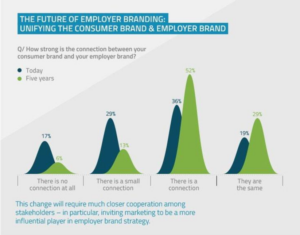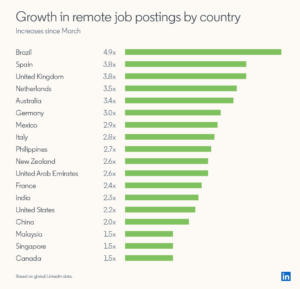
Employer Branding
The Most Emerging Employer Branding Trends 2021
04 JUNE 2021
Stepping into the employer branding year of 2021, most organisations do so having known a year with disruptive changes to the employee, candidate and workplace experience – all happening at once. How will this affect companies’ employer branding efforts moving forward? We’ve listed eight of the most emerging employer branding trends to keep track of.
1. Employer branding’s continued rise on the strategic agenda
It’s been more than two decades since Steven Hankin at McKinsey & Company coined the term war for talent. It’s exhilarating to see how organisations continue to embrace employer branding at a speeding pace, as the subject continues to climb on the strategic agenda. With 72 % of talent acquisition managers confident that employer branding has a significant impact on a company’s ability to attract and retain the right talent, this is no surprise. If you look at the rising number of job titles and open positions containing the term employer branding, you will reach the same conclusion. Rest assured, employer branding will continue its journey into the board rooms this year.
2. The employer brand and consumer brand converging
We continue to see an intensification in the connection between the consumer brand and the employer brand, something IKEA’s Global Employer Branding Lead Vasco Castro focused on at Oddwork’s Employer Branding Summit in December. Microsoft also stated it clearly at the digital World Employer Branding Day in November: “Our brand is our culture”.
The reasons behind the union of the employer brand and the consumer brand are many. First and foremost – nowadays, information is democratised. Soon we can research what it’s like to work in a specific company as easy as we can explore the products they sell – indeed a primary driver of authenticity. Also, with much of the world working remotely and experiencing tough times, brands and employer brands are fronted by their people.
So, what better way of communicating your brand’s authenticity than through employees? Social Talent visualises this trend and how the HR community expects the convergence between the employer brand and the consumer brand to increase in the coming years. We’ve already seen and will continue to see many great campaign examples of this trend from brands such as the New York Times, Volvo and Apple.

3. The emergence of remote cultures
2020 showed many of us that working from home or combining remote with in-office work, works quite well. More and more research shows a positive attitude toward remote work, with Spotify, Salesforce and Twitter leading the way on the continuity of remote work after the pandemic. PwC’s US Remote Work Survey, for example, show an increased positive attitude towards remote work both from employers and employees. As the working world becomes more accustomed to remote work, does that mean we as employees won’t value company culture and the feeling of belonging? We do not believe so, why remote cultures will be a big trend. But how? The workplace will have to become much more integrated as being both physical and digital, creating a positive employee experience regardless if you’re working from the physical office, from your home or a remote part of the world. Additionally, the remote culture surge will open up a whole new playground for global and diversified talent pooling – being a game-changer in itself.


4. Tracking the real-time employee experience
Focus on estimating employee experience has catapulted during 2020, and it’s not surprising that 96 % of HR and hiring professionals say employee experience is becoming more critical. With large chunks of organisations working remotely, the notion of relying on one or two annual employee surveys to stay informed on the employee experience is behind us. As the employee experience is a fundamental driver in retaining the right talent, both managers and employees are expected to be data-driven and informed via platforms such as Winningtemp. That is great! Leaders get real-time insights into developing their teams, and employees are seen, heard and turned into ambassadors.
5. Employer Value Proposition (EVP) to Target Value Proposition (TVP)
Developing a strong and authentic Employer Value Proposition (EVP) aligned with your company’s strategic goals is key to attracting and retaining the right talent. The EVP communicates what makes you unique as an employer and what unique benefits an employee will receive in return for the experience and skillset they bring to the company. In 2021 we will see the EVP, taking its whole-organisation approach, develop and branch out into TVPs – Target Value Proposition or Team Value Propositions.
Based on the overall EVP, the TVP focuses on role-based branding for specific key candidate target groups and what’s important to them, making total sense. Is it likely that the same talent attraction story will attract your IT team as your marketing team? Probably not. With an EVP supported by role-based TVPs, you’ll be able to communicate and attract each key candidate target group in the best way in 2021.
6. HR tech continues to improve the candidate experience
By default, HR and employer branding is about creating a great employee and candidate experience. But just because it’s a people industry, does that mean HR shouldn’t use technology? Quite the contrary. As Fredrik Mellander, Head of Partnerships at ATS rocket Teamtailor, said on Oddwork’s last Employer Branding Summit: “Tech is here to help you. It’s there to streamline your HR processes, and quality assures the candidate experience, regardless if you handle ten, hundreds or thousands of candidates at the same time.”
The industry agrees – in PwC’s HR Technology Survey 2020, 74 % of HR leaders see their investment in HR tech increasing in the upcoming years within the field of everything from gamification to chatbots. We will continue to see more exciting solutions that will continue to improve the candidate and employee experience in 2021.
7. Next level employer branding communication strategies
A couple of years back, the person responsible for an organisation’s employer brand was pretty much accountable for the career page, job ads and career fairs. Then came social media which has had a massive impact on candidates’ perception of an employer – 68 % of millennials, making up 75 % of the global workforce in 2025, visits a company’s social media channels to evaluate the employer brand before applying for an open position. Admittedly, having an employer branding social media strategy is so important.
Moving forward, we’ll see the employer branding channel strategies becoming increasingly innovative as new channels grow suitable for employer branding purposes. With new live stream platforms such as LinkedIn Live, employers’ expectation of increasing their social media efforts and communication of life inside the organisation will continue to grow. Other exciting examples are new rocket audio app Clubhouse, gaming platform Twitch and development community Stack Overflow where you can engage and reach candidates in new and innovative ways. No surprise 70 % of HR professionals say they will increase their use of social media in the next five years.
8. The employer brand becoming fully data driven
We’ll see the employer brand becoming much more data-driven moving forward, guided by a broader scope of KPIs than the classical ones such as average retention rate, eNPS and quality of hire. In conjunction with the trends mentioned above, such as HR tech, tracking real-time employee experience and next-level communication strategies, proactive employers will go much more in-depth when analysing employer brand experience. Actions will span from staying up to date on the real-time employee experience in all parts of the organisation, tracking candidate experience via a range of data points during the candidate journey and measuring social media engagement via employer branding communication funnels. In short – in 2021, we’ll see the employer brand becoming much more data-driven.
Watch Employer Branding Talks – The Most Emerging Employer Branding Trends 2021
Charles Sinclair, Head of Employer Branding, and Poyan Karimi, Senior Employer Branding Advisor at Oddwork talked about the most emerging employer branding trends 2021 at a live event on LinkedIn on February 16. Re-watch the event here.

Author
Charles Sinclair
Head of Employer Branding

Author
Poyan Karimi
Senior Employer Branding Advisor
